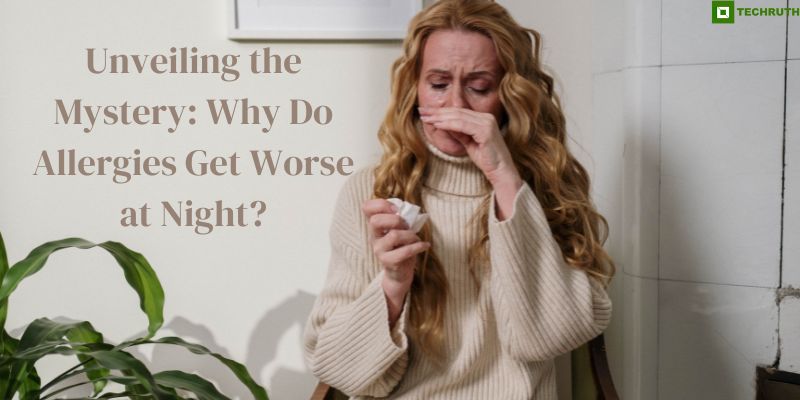Allergies can be a source of discomfort and irritation, affecting millions of people around the world. If you have ever wondered why your allergies seem to intensify at night, you are not alone. Many allergy sufferers have experienced this phenomenon, and there are valid scientific reasons behind it. In this article, we will discuss the factors that contribute to why do Allergies get worse at night, and explore ways to alleviate nighttime allergy symptoms.
Indoor Allergens Accumulate
One of the main reasons allergies can intensify at night is that indoor allergens tend to accumulate in your home throughout the day. Allergens like dust mites, pet dander, and mold thrive in a comfortable indoor environment. As you move around during the day, you stir these allergens up, causing them to become airborne.
To counter this, make sure to regularly clean your home, including vacuuming carpets, changing bed linens, and using air purifiers. These steps can reduce the concentration of allergens in your home and alleviate nighttime allergy symptoms.
Temperature and Humidity Play a Role
Temperature and humidity fluctuations throughout the day can also impact your allergies. As the evening approaches, the temperature tends to drop, and humidity levels rise. This creates an environment where dust mites and mold are more active. These allergens can trigger allergy symptoms such as sneezing, congestion, and itchy eyes.
To mitigate this, consider using a dehumidifier in your bedroom and maintaining a consistent temperature. By controlling these factors, you can create a less hospitable environment for allergens to thrive.
Pollen Levels Can Rise at Night
For individuals allergic to outdoor allergens like pollen, it may seem counterintuitive that allergies worsen at night. However, pollen levels can often rise during the evening hours. Plants release pollen early in the morning or during the day, but as the sun sets, the air cools down, and pollen particles can fall to the ground.
To reduce exposure to pollen, keep your windows closed at night and consider using air purifiers with HEPA filters. Additionally, showering and changing your clothes before bed can help remove any pollen that may have attached to your body during the day.
Nasal Congestion Becomes More Noticeable
At night, when you lay down to sleep, nasal congestion can become more noticeable and bothersome. The upright position during the day may keep your nasal passages relatively clear, but when you lie down, mucus can pool in your sinuses, leading to increased congestion and discomfort.
Using a saline nasal spray before bedtime can help keep your nasal passages moist and reduce congestion. Elevating your head with extra pillows can also assist in draining mucus and alleviating symptoms.
Allergy Medications Wear Off
If you take allergy medications, you may notice that their effects begin to wear off by nighttime, leaving your symptoms to resurface. Many allergy medications are designed to be taken once or twice a day, and the protection they offer may not extend throughout the night.
Consult your healthcare provider about the best allergy medication and dosing schedule for your specific needs. They can recommend suitable options, including antihistamines and nasal corticosteroids, to provide consistent relief day and night.
Conclusion
In summary, allergies can worsen at night due to various factors, including indoor allergens accumulating, temperature and humidity fluctuations, rising pollen levels, noticeable nasal congestion, and the wear-off of allergy medications. By understanding these triggers and taking proactive steps to reduce allergen exposure and manage symptoms, you can enjoy a more peaceful and allergy-free night’s sleep.
Remember that everyone’s allergies are unique, so it’s essential to work with a healthcare provider to develop a personalized allergy management plan. With the right approach, you can minimize nighttime allergy symptoms and wake up feeling refreshed and allergy-free.
You may also like:
Can a Humidifier Alleviate Allergies?
Can Allergies Cause Body Aches?
Can Allergies Cause Chest Pain?
FAQs
Q:- Why do my allergies seem to worsen at night?
Ans:- Allergies can worsen at night due to various factors. Indoor allergens like dust mites and pet dander accumulate during the day, temperature and humidity fluctuations can trigger allergens, pollen levels may rise in the evening, and nasal congestion becomes more noticeable when lying down. Additionally, allergy medications may wear off by nighttime.
Q:- What can I do to reduce indoor allergens at night?
Ans:- To reduce indoor allergens, maintain a clean home by vacuuming carpets, changing bed linens regularly, and using air purifiers. Keeping humidity levels under control with a dehumidifier and maintaining a consistent temperature can also help create an environment less conducive to allergens.
Q:- How can I minimize exposure to pollen at night?
Ans:- To minimize exposure to pollen at night, keep windows closed in the evening and use air purifiers with HEPA filters. It’s also a good practice to shower and change your clothes before bedtime to remove any pollen particles that may have attached to your body during the day.
Q:- Why does nasal congestion become worse at night?
Ans:- Nasal congestion can become worse at night because when you lie down, mucus can pool in your sinuses, making the congestion more noticeable and uncomfortable. Using a saline nasal spray before bedtime and elevating your head with extra pillows can help alleviate this symptom.
Q:- How can I ensure my allergy medications work effectively throughout the night?
Ans:- To ensure your allergy medications work effectively throughout the night, consult your healthcare provider for guidance. They can recommend the right medication and dosing schedule tailored to your specific needs. Some medications may need to be taken more frequently to provide consistent relief day and night.
